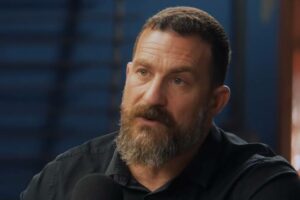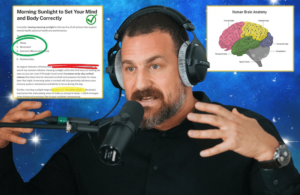Understanding the intricacies of the human brain, scientific research, and how they translate to personal health optimization can often be a bit overwhelming. Amidst all the complexity, figures like Andrew Huberman have emerged as beacons of clarity and pragmatism, illuminating pathways of understanding for both scholars and laypeople alike.

Huberman, an esteemed neuroscientist and science communicator, has become a household name in reference to the world of neuroscience and health. With a distinguished academic background and a fervent dedication to unraveling the mysteries of the brain, Huberman has transcended the confines of academia to become a leading figure in popular science discourse via his podcast “Huberman Lab” as well as his appearances on other major podcasts like “The Joe Rogan Experience” and “The Lex Fridman Podcast”.
Recent scrutiny, led by an article in The New Yorker, has, in a strangely ad hominem way, attempted to cast a shadow over Andrew Huberman’s public persona. The article frankly seems to be the textbook definition of a hit piece; calling into question the integrity of Huberman’s scientific communication and the potential influence of commercial interests by haphazardly weaving extremely personal details of this man’s intimate life throughout the sections that poke at his professional credibility.
While critique is an integral part of academic and social discourse it is necessary to engage in a thorough examination of the nuances surrounding Huberman’s contributions and the validity of the concerns raised, particularly today in the world of “cancel culture” where it somehow has become the standard to tear people down in these “Gotcha!” moments.
In this blog we are aiming to provide a more nuanced and grounded perspective on Andrew Huberman’s work, hoping to defend his contributions to neuroscience and science communication while addressing the criticisms laid forth by the New Yorker. By looking over Huberman’s approach to simplifying complex scientific concepts while navigating the intersections of academia, monetization, and the human flaws we all have, we aim to shed light on the difficulty inherent in science and health communication.
The Power of Popular Science Communication
In the advancing landscape of human health optimization, scientific research forms the bedrock upon which our collective wisdom rests. Yet, with all the intricacies of scientific discovery, there’s often a serious challenge: how do we translate the mysteries of complex science to everyone, not just scholars deep in the ivory towers of academia? This is where Andrew Huberman has stepped in; a neuroscientist and tenured professor in the department of neurobiology, and by courtesy, psychiatry and behavioral sciences at Stanford School of Medicine, wielding the beacon of popular science media with authority and genuine excitement for scientific accessibility.
Picture a world where neuroscience isn’t just a labyrinth of exclusive jargon, but a world of accessible wonder for everyone curious. Andrew Huberman seems to believe in this vision wholeheartedly. He knows that the language of the brain can be as baffling as it is fascinating and he is undeniably on a mission to translate the cryptic language of neuroscience into something everyday people can comprehend and use to uplift themselves. By breaking down the barriers of complexity, Huberman has empowered and continues to empower people to look into the inner workings of their own minds and bodies, sparking a newfound appreciation for the marvels of cognition, circadian rhythms, hormones, and so many other aspects of what makes us tick.
Huberman’s Role in Bridging the Gap
Through scientific understanding, people can shift their focus away from external heroes and instead lean into the remarkable organ nestled inside their skull: the human brain. This is the essence of Andrew Huberman’s work. Through his podcasts, social media presence, and captivating public talks, he guides us all through the intricacies of neuroscience in a way that offers a path forward from the largely tangled mess of mental, emotional, physical, and even spiritual dis-ease in the modern world. With a blend of childlike wonder and expertise, Huberman makes neuroscience approachable, and practical, inviting us to explore its wonders from a perspective of “Oh wait, I can actually do something about this”.

From unraveling the often vague complexities of stress and anxiety to shedding light on the science of sleep and circadian rhythms, Huberman’s repertoire knows few bounds; this is dually why people gravitate towards him and also why he’s received criticism as of late. The difference between Huberman and other popular science speakers is that he doesn’t just spout facts; he crafts narratives and dialogues that captivate, anecdotes that resonate, and insights that inspire because, well, they feel real. With each revelation and discussion, he has empowered millions of people to take the reins of their health, dispelling many commonly held myths and teaching people what academia understands about how this “life” thing works.
In essence, the power of popular science communication lies in its ability to transform the esoteric into the accessible and the confusing into creative potential; Andrew Huberman is a testament to the potential of this medium of science media. With his unwavering commitment to making neuroscience more accessible, Huberman stands as a beacon of empowerment for many who have fallen into the trap of helplessness.
Challenges in Public Communication of Neuroscience
Understanding and communicating the intricacies of neuroscience and human health is certainly no walk in the park – it’s more like navigating a dark jungle with hidden paths, dense vines, and inhabitants that may or may not want to kill you. The path Andrew Huberman has embarked on is certainly heroic in ways. At the end of the day, he is a human being, flaws and all, putting himself and his career in the public light, willingly placing himself in shooting range of journalists, who seem to be making a living off the perpetuation of cancel culture, in attempts to elucidate a complex scientific field.
Let’s be real here: neuroscience is tough, and being a public figure in the 21st century is potentially even tougher. The brain, with its countless neurons and connections, is a labyrinth of complexity, and social media platforms are filled with regular people and journalists alike clamoring for attention and recognition however they can get it. Huberman’s mission to simplify this complexity in the public domain is admirable, but it’s no small feat. Recent critics suggest that simplification and publicity can have their drawbacks. While making neuroscience accessible can have its benefits, there’s certainly a risk of oversimplifying and losing important nuances along the way, which is a valid critique and something to be wary of; critics argue that watering down the science could lead to misunderstandings or even distortions of the truth.
Challenges and Considerations of Podcast Monetization
As Andrew Huberman continues to expand his reach and influence through various platforms, including but not limited to his podcast, the question of monetization naturally arises for critics to pick at. While podcasts offer a valuable medium for reaching and engaging with audiences, monetizing them presents its own set of challenges, especially in a world where it’s trendy to say that capitalism is the root of all evil.
As Huberman ascends through podcast rankings on his mission to enrich the intellectual landscape, it’s obvious that monetization would be a natural progression of events. It seems that he makes clear efforts to maintain the integrity of his podcast amidst massive commercial interests that are likely beyond what the public is privy to. While some may take the integration of advertisements or sponsorships as compromising content quality, it’s necessary to recognize the delicate balance he’s trying to achieve here. Andrew has done a fair job of ensuring that he aligns commercial endeavors with his values and that the partnerships he’s made complement the educational essence of his podcast, which is essentially health and personal development. Say what you want about Athletic Greens, and criticize their formulation, sure, but Huberman is not advertising for new movies or real estate companies.
Monetizing a podcast is not merely about generating income; it’s about building a sustainable revenue model that sustains ongoing production costs while valuing the audience’s experience. If anything Andrew’s exploration of various monetization strategies demonstrates his dedication to growing his platform that, at its core, is an act of service. Whether through advertising, sponsorships, or premium content offerings, his approach is anchored in providing value to listeners on the route to ensuring financial stability. Anyone who has a problem with that should consider that their frustrations may simply be with capitalism itself rather than The Huberman Lab podcast.
By openly discussing any commercial partnerships and their implications, Andrew has undeniably fostered a sense of trust and respect within the podcast community as well as with his audience. This commitment to authenticity not only strengthens his relationship with listeners but also ensures that they feel valued and included in the journey, which is a lot more than most podcasters offer.
In navigating these challenges, Andrew Huberman has exemplified resilience and dedication to his craft as well as anyone else out there. By prioritizing content integrity, attempting to craft sustainable revenue models, and fostering transparent engagement with his audience, he’s contributing to a future where science communication can thrive and people can learn. Andrew’s endeavors deserve recognition if not support as he continues to enlighten and inspire through his podcast.
Conclusion
While there is always the risk of human error in attempts to simplify complex subjects, this does not necessarily merit attacking a man’s character for trying. So, where’s the sweet spot? It’s a tightrope act between accessibility and scientific integrity. While it’s vital to make neuroscience understandable, it’s equally important to stay true to the science. Huberman, and all science communicators, surely need to continually find and refine this delicate balance and be held to this standard, but the focus of critics should remain on their work as academics instead of waging ad hominem attacks levied by a crew of scorned ex-girlfriends.
Andrew Huberman does not claim himself to be perfect, in fact, he often admits to his flaws and reflects openly with other podcasters. Given his attempts to be much more open than other science communicators, tearing him down as if he has claimed perfection seems petty at best.
@neuroclique Lex Fridman Podcast | Podcast title: Andrew Huberman: relationships, drama, betrayal, sex, and love
♬ original sound - Neuro Clique
In short, simplifying neuroscience can be incredibly valuable for the general public, and it is essential to do it right. Public communicators must aim for clarity without sacrificing accuracy and we should hold them to that standard, but we cannot put their personal lives under a microscope without giving grace to the natural flaws of a human being.
At the end of the day, Huberman seems to communicate and create a platform for science with integrity and grace as well as anyone can muster; this is what makes the critique in the New Yorker seem… odd, seeing that it does not do much to invalidate him as an academic, but seems to be centered around tearing him down on a personal level as if to say “See? He’s not a good guy”.
People are flawed, all of us, but we must maintain some semblance of clarity in our critiques so that we can hold academics to the standards required to educate people effectively – we have to focus on the science.








